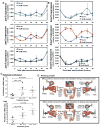Effects of diurnal variation of gut microbes and high-fat feeding on host circadian clock function and metabolism
- PMID: 25891358
- PMCID: PMC4433408
- DOI: 10.1016/j.chom.2015.03.006
Effects of diurnal variation of gut microbes and high-fat feeding on host circadian clock function and metabolism
Abstract
Circadian clocks and metabolism are inextricably intertwined, where central and hepatic circadian clocks coordinate metabolic events in response to light-dark and sleep-wake cycles. We reveal an additional key element involved in maintaining host circadian rhythms, the gut microbiome. Despite persistence of light-dark signals, germ-free mice fed low or high-fat diets exhibit markedly impaired central and hepatic circadian clock gene expression and do not gain weight compared to conventionally raised counterparts. Examination of gut microbiota in conventionally raised mice showed differential diurnal variation in microbial structure and function dependent upon dietary composition. Additionally, specific microbial metabolites induced under low- or high-fat feeding, particularly short-chain fatty acids, but not hydrogen sulfide, directly modulate circadian clock gene expression within hepatocytes. These results underscore the ability of microbially derived metabolites to regulate or modify central and hepatic circadian rhythm and host metabolic function, the latter following intake of a Westernized diet.
Copyright © 2015 Elsevier Inc. All rights reserved.
Figures




Comment in
-
Message in a biota: gut microbes signal to the circadian clock.Cell Host Microbe. 2015 May 13;17(5):541-3. doi: 10.1016/j.chom.2015.04.013. Cell Host Microbe. 2015. PMID: 25974294
References
Publication types
MeSH terms
Associated data
Grants and funding
- UL1 TR000430/TR/NCATS NIH HHS/United States
- P30 DK042086/DK/NIDDK NIH HHS/United States
- R01 DK038510/DK/NIDDK NIH HHS/United States
- NIDDK P30DK42086/PHS HHS/United States
- UH3 DK083993/DK/NIDDK NIH HHS/United States
- T32 GM007281/GM/NIGMS NIH HHS/United States
- DK42086/DK/NIDDK NIH HHS/United States
- T32 DK007074/DK/NIDDK NIH HHS/United States
- R37 DK047722/DK/NIDDK NIH HHS/United States
- UH3DK083993/DK/NIDDK NIH HHS/United States
- T32 EB009412/EB/NIBIB NIH HHS/United States
- DK097268/DK/NIDDK NIH HHS/United States
- DK47722/DK/NIDDK NIH HHS/United States
- NIGMS T32GM07281/PHS HHS/United States
- R01 DK097268/DK/NIDDK NIH HHS/United States
- R01 DK047722/DK/NIDDK NIH HHS/United States
LinkOut - more resources
Full Text Sources
Other Literature Sources
Molecular Biology Databases

